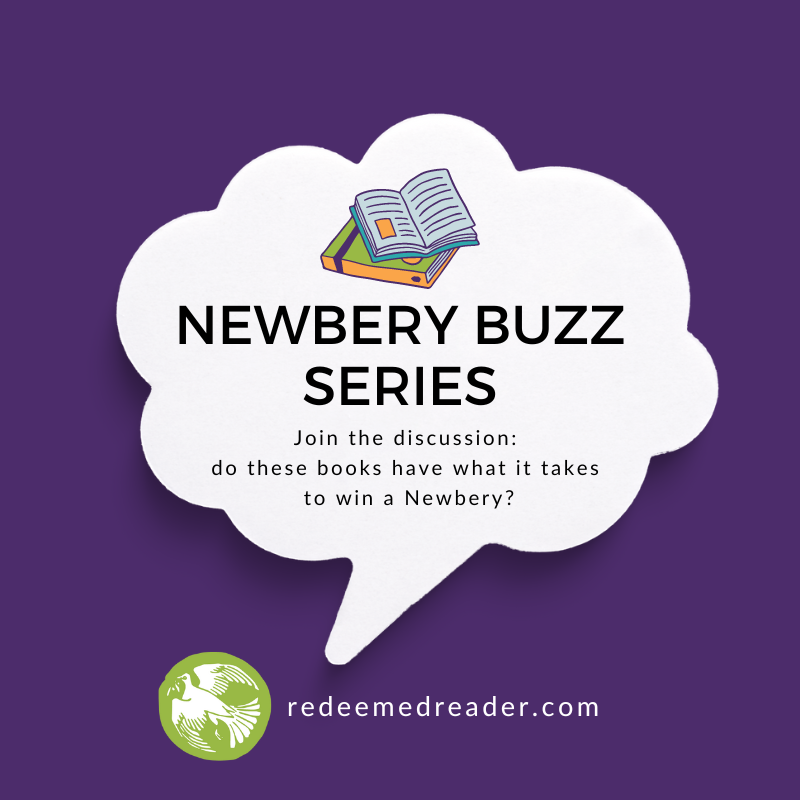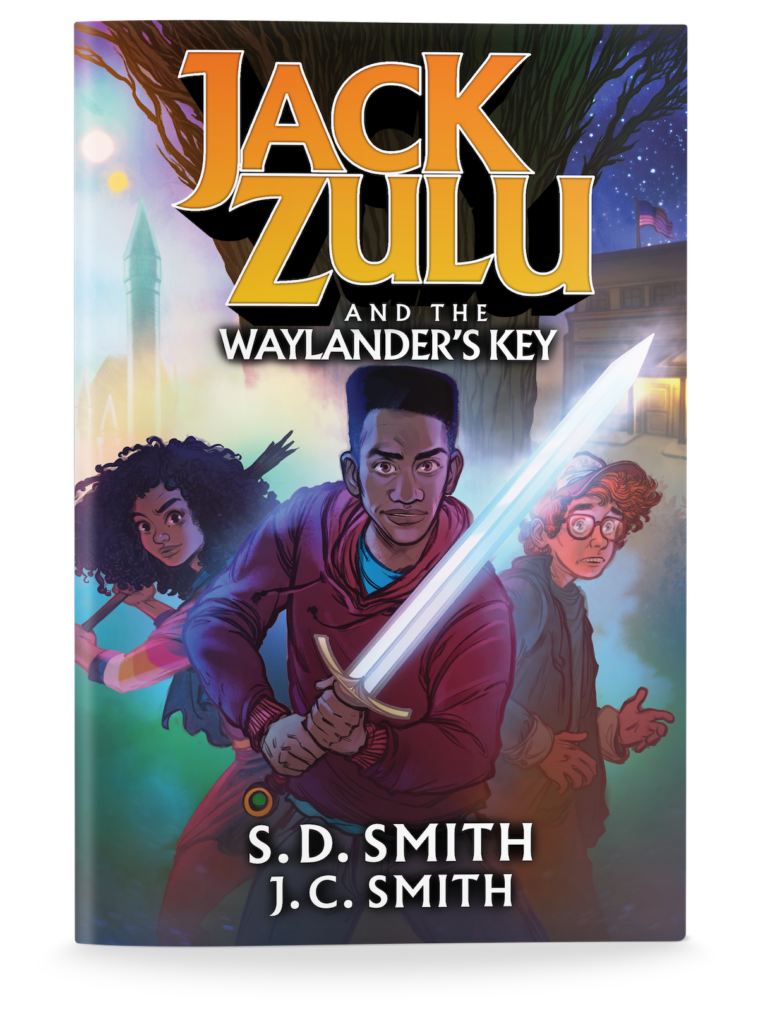Does an independently published novel like Jack Zulu have what it takes to win the Newbery?
We’re back with Newbery Buzz Discussion #4 for 2023. To read the rest in the series or previous years’ discussions, check out the Newbery Buzz Page.

Independently Published Books
Betsy: Megan, we’ve never discussed an independently published book in our Newbery Buzz series before! We’re breaking new ground. First, let me acknowledge that independently published books may never grace the Newbery stage. Why? For starters, they simply don’t have the marketing budget and resources of a big publishing house. Newbery committee members receive so many free books throughout the year, most—if not all—sent by publishers. There’s simply no way they can keep up with all the books that fly under the radar in the independent world.
Second, most independently published books are a bit more niche in their audience. But I think Sam Smith’s newest book (co-written with his teenaged son!) is worth discussing, partly because it won’t get the same kind of attention a book like The Door of No Return will.
Let’s dive into some of the other reasons that Jack Zulu is worth mentioning, though. First off, it’s a great story with a nicely paced plot, inventive happenings, and interesting characters. What stood out to you as one of the more distinctive parts of this story?
Megan: This is a unique story with a lot of positive elements in it. It felt familiar and yet fresh at the same time. I always find it interesting that baseball is the most literary sport, and football also came into play (pun not intended). Wheeler is the necessary mentor/guide that every hero needs. Not only does he have impressive significance in Wayland, he happens to be a bookstore owner like Oskar N. Reteep (from the Wingfeather books) who also happens to lend old books to the young, naive, fatherless hero. But since the story goes in and out of an Appalachian state, Wheeler’s personality reminded me more of Mr. Whitaker in the Adventures in Odyssey stories I listened to in my childhood.
Echoes of Other Stories?
In our children’s lit classes we talked about the difference between high fantasy that takes place entirely in another world (The Hobbit, Wingfeather Saga) and low fantasy which includes travel between worlds (Chronicles of Narnia, Harry Potter books). What did you think of Jack, Benny, and Michelle travelling so casually between their hometown and elsewhere? And do you think there’s any significance to Jack’s name? (We could ask Amanda Cleary Eastep, author of the Tree Street Kids books, the same question!)
Betsy: I’m not sure I’d use the word “casual” in reference to their travel between worlds. It’s a transition fraught with peril! In fact, I think the travel between worlds is much easier for Harry Potter and company than for Jack, Benny, and Michelle. I’m pondering the Narnia connection. One contrast is that in Narnia, the children are called, or summoned, to Narnia; it is never by their choice. And, once in Narnia, they stay in Narnia for the duration of that particular volume. (With the possible exception of The Magician’s Nephew…). In Harry Potter’s world, once students are at Hogwarts, they’re supposed to stay put at Hogwarts. But the magical world overlays the “Muggle” world, and wizards can travel freely between the two. I think the portal between worlds in Jack Zulu reminds me most of that in 100 Cupboards: the children have agency, but there’s risk. And evil things can come into our own world from those other worlds just as much as the children can leave earth to work good in other realms. The very portal demands discernment, caution, and bravery.
I’m interested in this comparison game, though. Perhaps that’s what appealed to me about Jack Zulu. It reminds of me of so many other great fantasy stories. You mentioned the bookshop owner in the Wingfeather books, Oskar N. Reteep. And Whitaker from Adventures in Odyssey is perfect! I hadn’t thought of either of those until you mentioned them, and a lightbulb went off. The bookshop owners function as mentors, and most great fantasy books feature a mentor for the young protagonist who is just learning how to navigate this new magical realm. Additionally, the mentors protect the young protagonist(s), journeying with them through the story. Hagrid and Dumbledore both function this way for a young Harry. Doctor Cornelius guides young Prince Caspian. Dallben guides Taran in the Chronicles of Prydain. Halt coaches young Will in The Ranger’s Apprentice. And so forth.
Another trope playing prominently in Jack Zulu is the absent father and endangered mother. Does that remind you of other stories? How is this one similar or different?

Megan: Do you think there’s a hint that he might not be as dead as everyone assumes? All the stories you mentioned where there are guides have the absence of a father in common. I think it’s part of the coming-of-age story, forcing a boy to rely on a father figure, while needing to make his own way without the protection that his own father would tend to provide. Tom Sawyer, Mighty Jack, N.D. Wilson’s characters, and any fairy tale where the father dies and the son (or sons) has to make his own way in the world share this trope. The endangered mother reminded me most of Diggory’s mother in The Magician’s Nephew. In both cases, the temptation to do evil in order to gain medicine for a family member is almost overpowering, but the consequences would actually have been worse if the fledgling hero gave in against his better judgment. (In fact, that reminds me of another book we just read, I Must Betray You by Ruta Sepetys!)
A Contemporary Story with Classic Appeal
Betsy: Ooh, we’ll have to save that for our next Newbery Buzz discussion which is all about I Must BetrayYou! And I also wondered if Jack’s father wasn’t really dead. Everyone assumes that, but I think there’s hope that he’s simply missing…. Guess we’ll have to wait and see!
Jack Zulu has so many elements of great classic adventure stories. What helps ground this story firmly in the contemporary children’s literature lineup?
Megan: Even though no cell phones or video games are mentioned, references to pizza, Star Wars costumes, and experimental cancer treatments are very contemporary. I appreciate the fact that Jack is bi-racial, his sidekick is a white kid with red hair (like Ron Weasley), and his crush is a beautiful Black girl. The Smiths aren’t shy about references to prayer or church, but it doesn’t feel forced either.
What other themes or motifs did you notice? What stood out to you about Jack, Benny, and Michelle as characters?
Betsy: I agree: the characters feel very natural, and their differences (race, religion, gender, etc.) seem simply part of who they are, not the reason-for-their-existence-in-the-story like so many in contemporary stories. Rather, this is a close knit community, whether you’re from a large red-headed Catholic family, a biracial kid with an absent father, or a Black girl who’s in the same class as the boys. Their differences function as both strengths and weaknesses, like our own do in real life. And the kids must learn to love one another in the midst of those differences as well as in the struggles they’re facing individually and collectively.
Does Jack Zulu Have What It Takes?
Moving on to the reason for this discussion series: do you think Jack Zulu has that distinctive quality that the Newbery committee might be looking for? Does it have what it takes to land a shiny sticker on the cover? (Even though we know its actual odds are slim on the basis of it being independently published.)
Megan: I think it’s the kind of book that will appeal to lots of readers, but not necessarily a committee of professionals who have certain opinions about what children ought to read. Sometimes that’s the way it feels…the book that gets a shiny sticker has a certain kind of merit, but not always delight. Thankfully there are exceptions, and while I hope Jack Zulu wins an award from somewhere, ultimately the best commendation is well-turned pages.
Betsy: Well put, Megan! And I do think Jack Zulu copies will feature well-turned pages, regardless of the presence or absence of front cover stickers. Readers, what do you think?
Support our writers and help keep Redeemed Reader ad-free by joining the Redeemed Reader Fellowship.
Stay Up to Date!
Get the information you need to make wise choices about books for your children and teens.
Our weekly newsletter includes our latest reviews, related links from around the web, a featured book list, book trivia, and more. We never sell your information. You may unsubscribe at any time.
We'd love to hear from you!
Our comments are now limited to our members (both Silver and Golden Key). Members, you just need to log in with your normal log-in credentials!
Not a member yet? You can join the Silver Key ($2.99/month) for a free 2-week trial. Cancel at any time. Find out more about membership here.

